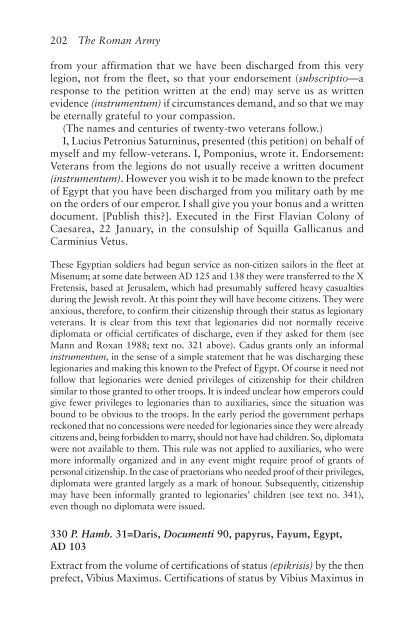The Roman Army, 31 BC–AD 337: A Sourcebook
The Roman Army, 31 BC–AD 337: A Sourcebook
The Roman Army, 31 BC–AD 337: A Sourcebook
You also want an ePaper? Increase the reach of your titles
YUMPU automatically turns print PDFs into web optimized ePapers that Google loves.
202 <strong>The</strong> <strong>Roman</strong> <strong>Army</strong><br />
from your affirmation that we have been discharged from this very<br />
legion, not from the fleet, so that your endorsement (subscriptio—a<br />
response to the petition written at the end) may serve us as written<br />
evidence (instrumentum) if circumstances demand, and so that we may<br />
be eternally grateful to your compassion.<br />
(<strong>The</strong> names and centuries of twenty-two veterans follow.)<br />
I, Lucius Petronius Saturninus, presented (this petition) on behalf of<br />
myself and my fellow-veterans. I, Pomponius, wrote it. Endorsement:<br />
Veterans from the legions do not usually receive a written document<br />
(instrumentum). However you wish it to be made known to the prefect<br />
of Egypt that you have been discharged from you military oath by me<br />
on the orders of our emperor. I shall give you your bonus and a written<br />
document. [Publish this?]. Executed in the First Flavian Colony of<br />
Caesarea, 22 January, in the consulship of Squilla Gallicanus and<br />
Carminius Vetus.<br />
<strong>The</strong>se Egyptian soldiers had begun service as non-citizen sailors in the fleet at<br />
Misenum; at some date between AD 125 and 138 they were transferred to the X<br />
Fretensis, based at Jerusalem, which had presumably suffered heavy casualties<br />
during the Jewish revolt. At this point they will have become citizens. <strong>The</strong>y were<br />
anxious, therefore, to confirm their citizenship through their status as legionary<br />
veterans. It is clear from this text that legionaries did not normally receive<br />
diplomata or official certificates of discharge, even if they asked for them (see<br />
Mann and Roxan 1988; text no. 321 above). Cadus grants only an informal<br />
instrumentum, in the sense of a simple statement that he was discharging these<br />
legionaries and making this known to the Prefect of Egypt. Of course it need not<br />
follow that legionaries were denied privileges of citizenship for their children<br />
similar to those granted to other troops. It is indeed unclear how emperors could<br />
give fewer privileges to legionaries than to auxiliaries, since the situation was<br />
bound to be obvious to the troops. In the early period the government perhaps<br />
reckoned that no concessions were needed for legionaries since they were already<br />
citizens and, being forbidden to marry, should not have had children. So, diplomata<br />
were not available to them. This rule was not applied to auxiliaries, who were<br />
more informally organized and in any event might require proof of grants of<br />
personal citizenship. In the case of praetorians who needed proof of their privileges,<br />
diplomata were granted largely as a mark of honour. Subsequently, citizenship<br />
may have been informally granted to legionaries’ children (see text no. 341),<br />
even though no diplomata were issued.<br />
330 P. Hamb. <strong>31</strong>=Daris, Documenti 90, papyrus, Fayum, Egypt,<br />
AD 103<br />
Extract from the volume of certifications of status (epikrisis) by the then<br />
prefect, Vibius Maximus. Certifications of status by Vibius Maximus in



